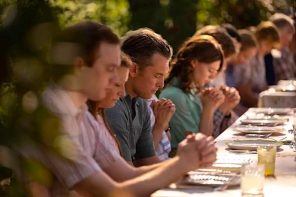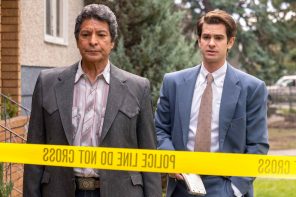According to Newsweek’s Joshua Alston, TV is losing its religion. His proof? The cancellation of Kings, NBC’s clever take on the King David story. But for those with eyes to see and ears to hear, religion on television isn’t in decline. It’s everywhere: in shows from Saving Grace to Supernatural, and from Grey’s Anatomy to House. Channel surfers can stumble on stories of euthanasia, polygamy, and gay unions or catch sight of angels, demons, and bearded rabbis. If the quest to understand what makes us human is religion’s beating heart, then there’s much to behold in primetime; especially for the growing numbers of religious “nones,” whose search for meaning stops at the church door.
Newsweek, however, still hews to the mainstream media formula that says news is what’s missing, what’s wrong or what’s a problem—whether it’s crime stats, politics or television. In some respects, Alston is right: Shows with explicit religious hooks tend to fare poorly. But flying under the radar of most pop culture critics is a progressive perspective that shapes a critique seen in depictions of material excess, spiritual flimflam and thorny ethical issues. Some shows that do this don’t last more than a season or two, but even a short run can be consequential. (Especially since cancellations often say more about network politics and priorities than audience popularity.)
Take that old warhorse 24. For its first few seasons, its emphasis on torture resonated with post 9/11 paranoia. But when Dick Cheney became the series’ number one fan and American soldiers began borrowing from Jack Bauer’s playbook, critics called for an end to confusing fiction with reality. Confronting the backlash, season 7 found Jack in a Senate hearing room trying to justify enhanced interrogation techniques to skeptical politicians. But when terrorists strike the White House, Jack’s do-what-it-takes philosophy is way more effective than the FBI’s wimpy by-the-book moves. Tellingly, it’s increasingly clear that Jack has sacrificed his soul for the nation’s good. Spiritually empty, he’s ready to die after exposing himself to a lethal bioweapon. Nearing the end, he asks a Muslim cleric for forgiveness, a deathbed confession that moved some viewers, but left others apoplectic. (Online chatter continues as to whether or not Jack converted.)
In its own bludgeony way, 24 substantiates the torture/terror debate better than the news media does. Maybe it’s the fist-in-mouth dramatization or perhaps it’s the fictional distance. But it also could be that TV is permitted to pose and explore ethical questions (what kind of country are we?) and spiritual ones (what kind of person am I?) that journalists don’t or won’t touch. So even though 24 isn’t about religion per se, it addresses key religious issues in a manner familiar to anyone who’s read the Bible: telling stories of heroes and villains whose struggles reflect our own. (Check out Mark Sanford’s reading of the King David story to see the power of these narratives at work in a contemporary context.)
At the other end of the spectrum is a show (ostensibly about a religious community) that has very little to do with organized or institutional religion, yet raises all kinds of spiritual and moral issues. Confused? So are the family members on Big Love, the HBO drama about a polygamous family. Bill Hendrickson and his three wives rarely perform religious rituals or discuss their faith, but their beliefs suffuse their daily activities, starting with three interconnected homes on an otherwise typical suburban street.
By portraying a “normal” family that is anything but normal, Big Love queers mainstream notion of gender and family. Who is a family? What are women’s roles? How do we raise children to be productive members of society? When I’ve watched the show with students, their take on the family quickly switches from ick to click. Most everyone who has grown up in a “typical” American home has experienced some form of familial dysfunction so the Hendricksons’ foibles, viewed alongside their struggles to share housework, parenting, and breadwinning within a loving committed relationship, take on a new light.
Is Big Love about religion? Not exactly, there isn’t much there that fits common understandings of what organized religion is, does, or teaches. But for the past few decades, issues of family and gender have been central to America’s religious debates. Big Love dramatizes these debates in its portrayals of alternate families. Yet the show also pulls back for a probing look at the daily practice of religion. We all know that religious sensibilities can influence child-rearing and marital relations, but what about business practices, community standards, and civic polity? The Compound, the commune in Big Love that resembles the Fundamentalist Church of Jesus Christ of Latter Day Saints’, addresses these questions, showing what can go wrong even when believers act in God’s name.
My recent teaching and writing on religion and television has focused on post 9/11 narratives. But a spate of new series has me wondering if economic angst is replacing apocalyptic anxiety as a meta-narrative. Just as earlier shows explored how we live, why we die, and whether there’s a hereafter, several new programs hone in on what we value, what those values say about us, and how we deploy our resources.
NBC’s The Philanthropist crystallizes this shift. The saga of a bad-boy billionaire who becomes a “vigilante” do-gooder following his young son’s death, the series has done middling-well as a summer replacement. Explicit about their message of commitment and change, the show’s principals sound positively Obamaesque in interviews. Their creation, philanthropist Teddy Rist appears to have it all—looks, charm and loads of dough, but his life lacks meaning until he uses his money to help others help themselves.
Dirty Sexy Money (DSM) takes place in an alternate universe but its message is strikingly similar. The members of the Darling family are rich, powerful, svelte, and sleek, but they’re also shallow, corrupt, and self-indulgent. They’re just like the rest of us—but more so. Borrowing from other lifestyles-of-the-rich-and-famous evening soaps (think Dallas, Dynasty and Falcon Crest for starters), DSM’s balance of satire and cynicism makes the show lighter and brighter than its precursors.
After ABC cancelled DSM this spring, I learned that its creator, Craig Wright, is a former seminarian who’d been working for a church when Hollywood beckoned (actually it was Alan Ball asking him to write for Six Feet Under). I don’t need to read a lot into this to assume that Wright is familiar with religion and the power of narrative. Describing the Darlings’ stories in a 2007 interview, he said: “They are about a family and they are about the struggles of what it means to be a human being.” The heart of that struggle is the search for meaning; a goal that despite money, power, and privilege, none of the Darlings master.
‘Money isn’t everything’ is a tried-and-true TV trope, but recent series like The Philanthropist and Dirty Sexy Money push it harder than earlier outings. Previous series often had a wink-wink aspect that reassured audiences that, all things considered, rich is better. No longer. On True Blood, Maryann Forrester, Bon Temps’ own Lady Bountiful, looks to be the wealthiest, as well as the worst, “person” around. Luxury is the bait needed to lure humans within psychological striking distance for her black magic. Living large also is a trap in the now defunct Eli Stone. Greedy lawyers drive sports cars and wear fine Italian suits, but good lawyers find self-respect and love through pro-bono work. According to Eli and his colleagues, religion isn’t only on Saturdays or Sundays. It’s lived throughout the week. TV characters, reflecting our own struggles to do good amidst daily temptation, have something to teach us.
So, Joshua Alston, I’d argue that religion on television looks to live long and prosper on TV. Broadcast and cable channels offer a rich array of shows asking religious questions, exploring religious themes, and providing religious alternatives to secular norms. Several, obliquely commenting on consumerist culture, even mount a subversive charge. This is the more surprising since television, like newspapers, is all about advertising wrapped up as infotainment. It’s not supposed to challenge basic societal assumptions that keep us in a constant state of wanting and needing to buy more. But even as the economic downturn makes consumerism less practical, few political or religious leaders are challenging the notion that spending leads to happiness. How ironic that television is, in some instances, addressing the very spiritual and ethical issues on which our religious and political institutions appear to be taking a pass.




